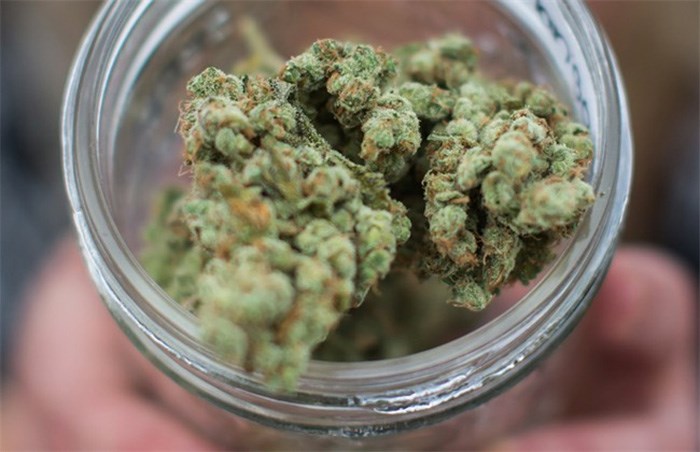Some Canadian police forces are hesitant to use a federally approved roadside test for marijuana impairment, raising questions about the Liberal government's decision to give the devices the green light.
Vancouver's police department is among those that won't use the Drager DrugTest 5000 when pot is legalized next month because it says the device doesn't work in sub-zero temperatures, is bulky and takes too long to produce a sample.
 A vendor displays marijuana for sale during the 4-20 annual marijuana celebration, in Vancouver, B.C., on Friday April 20, 2018. The federal governnment’s bill to legalize recreational cannabis is on its way back to the Senate. THE CANADIAN PRESS/Darryl Dyck
A vendor displays marijuana for sale during the 4-20 annual marijuana celebration, in Vancouver, B.C., on Friday April 20, 2018. The federal governnment’s bill to legalize recreational cannabis is on its way back to the Senate. THE CANADIAN PRESS/Darryl Dyck
"Our experts within the VPD have looked at it and we're just not comfortable moving forward with this machine and we're looking at other options," said Sgt. Jason Robillard.
The department plans to purchase one of the devices to test its capabilities, but for now officers will rely on standard field sobriety tests and drug recognition experts, he said.
Police in Delta, B.C., say their officers won't use the device this year but the department hasn't made a decision about 2019, while Edmonton police and B.C.'s provincial RCMP say no decisions have been made yet.
National RCMP spokeswoman Sgt. Marie Damian said the force will have a strategic, limited rollout of the device in consultation with provincial and municipal partners.
Standardized field sobriety test and drug recognition experts will continue to be the primary enforcement tools, she said in a statement.
"Roadside drug screening equipment will provide an additional tool to help Canadian police officers detect and investigate drug-impaired drivers," she said.
RCMP national headquarters has ordered 20 of the units to facilitate the training of its officers, she said. The training will be classroom-based and will be available to police "on or prior to" Oct. 17, when marijuana will be legal.
Rob Clark, managing director of Drager Canada, said misinformation has been spreading about the devices and it's important to remember that police forces do take time to adopt new technologies.
"I think there's an unrealistic expectation in terms of how long it takes for the police to prepare themselves to roll something like this out," he said.
Clark also disputed the criticisms of the device.
It operates best between temperatures of 4 C and 40 C. But the main part of the machine — which does the reading and analysis — remains in the police vehicle where it's protected from the cold, he said.
It's only the oral swab that collects the saliva sample from the driver that is exposed to extreme temperatures. But Clark said the sample can be heated up when plugged into the machine in the car.
He said it typically takes about 30 seconds to a minute to collect a saliva sample and 4 1/2 minutes to get the test result.
Clark stressed the devices are merely a screening tool and the result does not provide the evidence to convict a driver, the same as breathalyzers for alcohol. He said a blood test would be relied on in court.
Kyla Lee, a criminal defence lawyer with Acumen Law in Vancouver, said she's planning a constitutional challenge of the devices in part because the time it takes to produce a result is at odds with charter rights.
She said she purchased a Drager DrugTest 5000 and tried it on herself. It took two and a half minutes to collect a saliva sample and eight to 10 minutes to get a result, she said.
Canadians have a legal right to a lawyer immediately upon arrest or detention. But in cases of roadside testing that right is suspended as long as the testing is done immediately, she said.
"There have been tons of cases at all levels of court that have found delays of even five minutes in doing roadside sobriety testing to be offensive to charter standards," she said.
Before she can launch legal court action, Lee said she'll have to wait for the device to be used by police on a driver who wants to challenge the use of the device in court.
Lee added the device produces "very high" rates of false positives.
A study published this year in the Journal of Analytical Toxicology examining the use of the test in Norway said it produced "fairly large proportions of false-positive or false-negative results compared to drug concentrations in blood."
The study found the proportion of false-positives was 14.5 per cent for cannabis.
However, the authors noted the Norwegian police say the test is still a "valuable tool" in identifying possible drug-impaired drivers and has more than doubled the number of arrests.
Clark, with Drager Canada, said the study did not prove that the test produces the number of false positives claimed by the authors.
He said Norwegian police allowed up to four hours before a blood test was taken. The drivers were likely no longer intoxicated by that time, he said.
The Canadian Society of Forensic Science ran over 200 tests and found the device was 99.1 per cent accurate for cocaine and 98.7 per cent accurate for THC, the psychoactive ingredient in cannabis, he said.
The society did not immediately respond to a request for comment.
— Follow @ellekane on Twitter.


